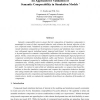Free Online Productivity Tools
i2Speak
i2Symbol
i2OCR
iTex2Img
iWeb2Print
iWeb2Shot
i2Type
iPdf2Split
iPdf2Merge
i2Bopomofo
i2Arabic
i2Style
i2Image
i2PDF
iLatex2Rtf
Sci2ools
135
Voted
PADS
2009
ACM
2009
ACM
An Approach for Validation of Semantic Composability in Simulation Models
Semantic composability aims to ensure that the composition of simulation components is meaningful in terms of their expressed behavior, and achieves the desired objective of the new composed model. Validation of semantic composability is a non-trivial problem because reused simulation components are heterogeneous in nature and validation must consider various orthogonal aspects including logical, temporal and formal. In this paper, we propose a layered approach to semantic composability validation with increasing accuracy and complexity. Firstly, concurrent process validation exploits model checking for logical properties of component coordination including deadlock, safety, and liveness. Secondly, meta-simulation addresses temporal properties by validating safety and liveness of the composition through simulation time. Thirdly, perfect model validation provides a formal composition validation guarantee by determining the behavioral equivalence between the composed model and a perfect...
Modelling And Simulation | PADS 2009 | Semantic Composability | Semantic Composability Validation | Simulation Components |
Related Content
| Added | 19 May 2010 |
| Updated | 19 May 2010 |
| Type | Conference |
| Year | 2009 |
| Where | PADS |
| Authors | Claudia Szabo, Yong Meng Teo |
Comments (0)

